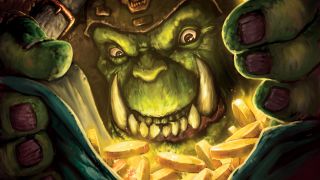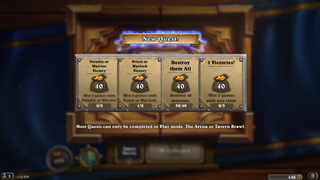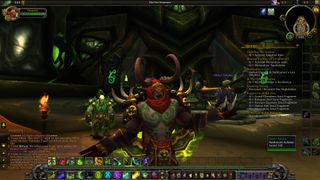Daily quests aren't fun, they're tedious
How just a couple easy quests a day can really get in the way of a good time.

It's an odd feeling when playing games weighs on you like an obligation. While the discussion over the unsavory ways that developers manipulate players is entirely dominated by loot boxes and microtransactions these days, that's not the only tool to entice players to come back again and again. If you're a fan of Hearthstone, Destiny 2, World of Warcraft, or even Rainbow Six Siege, you're already acutely aware of the draw these games have to log a little time in each day—even if you don't want to. It can feel overwhelming. And it's all thanks to the daily quest system that many of these games employ.
On the surface, daily quests are a smart way to entice players to come back each and every day. The idea is simple: set up a few meta-objectives that reset every 24 hours. In Hearthstone, for example, daily quests can range from slinging 20 spells over the course of several games to winning a few rounds as a specific class.
From a developer's perspective, daily quests can keep players coming back again and again—that's crucially important if your game is funded through microtransactions and paid DLC like Hearthstone or Siege. In subscription-based MMOs, daily quests keep players coming back between major updates, giving them an infinite series of tasks to complete when all others have long since been completed. It's a system that, at best, gives you a little extra reward for things you're already doing in-game. But in execution, daily quests can turn the joy of playing into a monotonous chore—especially when you're juggling multiple games that have them.
Long-term investments
While daily quests can be found in games dating back to everyone's favorite social-media-meets-Pokémon website Neopets, their most known implementation was in World of Warcraft's first expansion, The Burning Crusade. At the time, daily quests (or 'dailies') seemed like an elegant solution to the age-old problem of MMOs never having enough content for players to complete. Blizzard's solution? Add a system of mundane repeatable quests that players could grind through each day to work towards long term goals like earning gold or gaining reputation with certain factions.
But in execution, daily quests can turn the joy of playing into a monotonous chore.
If the decades of forum posts are anything to go by, daily quests weren't a hit with players. Instead of capitalizing on Warcraft's most exciting group content, like dungeons and raids, they forced players into neverending loops of killing 'X' of 'Y.' Azeroth's greatest heroes became its ultimate labor force. But, somehow, the system has survived and spread to nearly every game Blizzard makes and well beyond. It's become such a staple in digital card games that I can't think of one that doesn't have daily quests. Even competitive shooters are starting to see the appeal.
But what is that appeal?

While daily quests aren't likely to ruffle the feathers of gamers in the same way that loot boxes have, they still try to manipulate us. Like arcade games designed to extract quarters from pockets, daily quests are another small (but not necessarily insidious) facet in the complicated relationship games have with our need to feel rewarded. Daily quests offer a tangible goal to meet each day and the feeling that, even if I only have a few minutes to spare, I can earn a little extra if I use them right. But too often, I find myself resenting the fact that they exist at all.
The biggest gaming news, reviews and hardware deals
Keep up to date with the most important stories and the best deals, as picked by the PC Gamer team.
In competitive multiplayer games like Hearthstone, daily quests go deeper than giving you a little extra gold. They are intrinsically tied to your worth as a player. The problem with competitive free-to-play games that use daily quests is that if you ignore them, there's a palpable sense of missing out. It's no longer just about how good you are, but how many hours (or dollars) you can invest. Because these quests reward gold used to pay for new card packs which, in turn, have a chance to reward more powerful cards, daily quests feel necessary instead of optional. It's not a little "thank you" for playing each day, it's clocking in for work so that you can have fun later.
It's not a little "thank you" for playing each day, it's clocking in for work so that you can have fun later.
Unless I'm willing to cough up money to buy these packs and skip that grind altogether, I need to optimise how much gold I can earn. My objective subtly shifts from having fun to completing these quests as quickly as possible. If one of my daily quests asks that I win three rounds as class I don't have a competitive deck for, I'm frustrated as I'm stuck playing matches hoping for an easy win or just ignoring the quest altogether and feeling like I'm missing out on valuable gold. Instead of playing a class that I've invested in and care about, I'm forced into playstyles that I may not find fun or satisfying.
In MMOs, daily quests create a more abstract sense of frustration. Daily quests aren't a meta-objective, but a wholly separate activity you have to make time for. Final Fantasy 14, for example, has various Beast Tribes that each have a set number of daily quests that offer currency that can be spent on powerful gear in addition to reputation with a faction that unlocks items and cosmetic gear like mounts. These quests are never fun, but MMOs continually leverage their weakest elements, like fetch quests, for use in daily quests. It doesn't matter how cool that mount may seem, every time I've done the math and realized I would need to login every day for the next 24 days to complete these quests to unlock it, I immediately resent the grind and abandon it altogether.

It's worth noting that not every daily quest system is a bad one, but many of them are designed poorly. Ironically, World of Warcraft: Legion's world quests, a complete overhaul of the old dailies, is actually pretty great. Not only does it offer a ton of choice and variety over which quests you want to complete, you are also given tangible rewards that can be immediately satisfying, like a new piece of gear. If you complete four quests for a specific faction each day, you'll also unlock even more rewards.
What's more, world quests act like a Greatest Hits of Legion's leveling process, letting you revisit wacky and fun quests all over again. And, while they're still dedicated activities, you can bang out four of these quests in about 12 minutes. It's a quick and inoffensive system with multiple layers of rewards that helps hide the monotony and necessity of doing them—a start difference from Final Fantasy 14's monotonous routine.
But daily quests still represent a symptom of a wider issue many MMOs and multiplayer games with a progression system struggle with: the feeling that you have to constantly play in order to stay relevant. Whether they're a necessary part of grinding in-game currency or an abstract way of gaining power, daily quests almost always leverage the most boring and frustrating parts of a game in exchange for a reward. Put up with this crap, they say, and eventually you'll get something good.
I must constantly be skeptical of games, their developers' intentions, and my motivations for why I keep playing.
Earlier this year, I wrote about how I'd finally given up the grind in World of Warcraft, embracing my status as a "casual" to just enjoy the game at my own pace. It was a liberating experience. But it's frustrating to see that grind seep into other games, to have my precious few hours of gaming become a list of chores I need to knock out in each game before the real fun begins. I must constantly be skeptical of games, their developers' intentions, and my motivations for why I keep playing.
Like towers unlocking sections of the map in open world games and loot boxes, daily quests will continue spreading to other games. Game design is often seen as an art but there's a science to it as well, and developers are always experimenting with new ways to keep us playing. Daily quests are rather innocuous on the surface, but understanding how they factor into your desire to play is important. And, like me, you might have to ask yourself the tough question. Is a little bit of extra gold a day really worth it?
With over 7 years of experience with in-depth feature reporting, Steven's mission is to chronicle the fascinating ways that games intersect our lives. Whether it's colossal in-game wars in an MMO, or long-haul truckers who turn to games to protect them from the loneliness of the open road, Steven tries to unearth PC gaming's greatest untold stories. His love of PC gaming started extremely early. Without money to spend, he spent an entire day watching the progress bar on a 25mb download of the Heroes of Might and Magic 2 demo that he then played for at least a hundred hours. It was a good demo.
Most Popular


